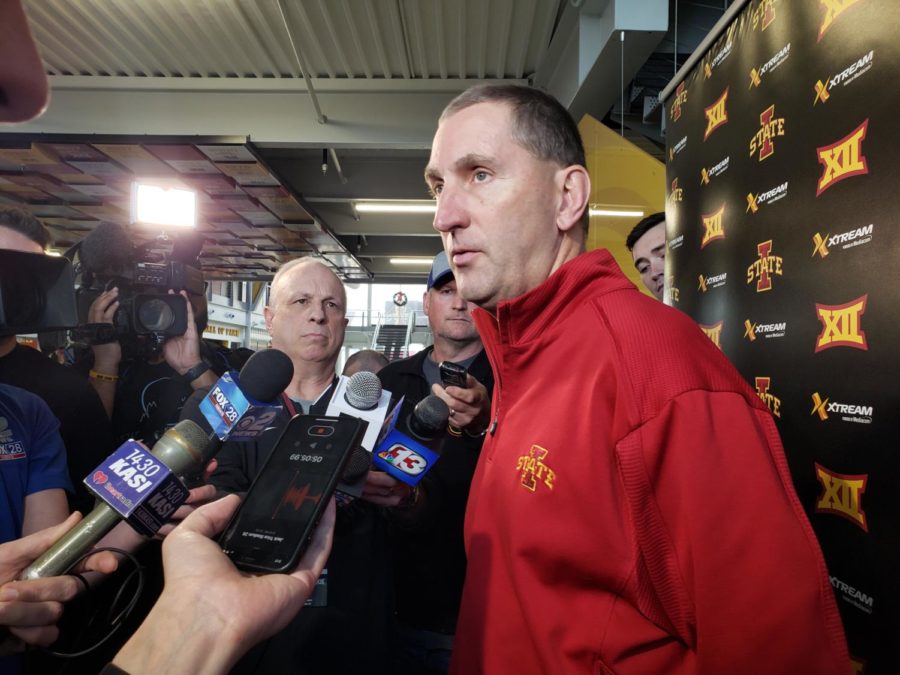Jamie Pollard talks potential financial losses if no sports are played in the fall
July 13, 2020
Iowa State Athletic Director Jamie Pollard has written a letter to the Iowa State community to clarify the reasons why the athletic department is trying to do everything in its power to “play college sports this fall.”
Pollard said in Monday’s letter that the athletic department would lose about $40 million in unfunded expenses in the next six months if college sports can’t be played in the fall, Pollard said the cuts that could happen would be in layoffs, reductions or eliminations and maybe the elimination of some sports at Iowa State.
The letter said that some have framed this issue as safety versus revenue generation, but that the “reality lies somewhere in the middle.”
Pollard reiterated that the athletic department is working toward implementing mitigation efforts to reduce the risk of fans and players getting COVID-19 at games in the fall and that more details will be released in the near future.
The letter goes on to break down the athletic department’s budget.
According to the letter, the $55 million total of fixed costs breaks down to $30 million in salaries, $10 million in debt service, $9 million in scholarships and $6 million in utilities and other expenses.
Variable costs breaks down like this; $12 million in sports program operations; $7 million in academic, medical and nutrition; $6 million in facilities and events; and $6 million in administration.
Pollard said, “The Iowa State athletics budget does not include any state or university funding and relies mainly on television revenues, private donations and ticket sales.”
In the letter Pollard, said he believes it’s best to be transparent about the finances involved with college sports heading into the fall.
“We felt it was important to be transparent about the financial realities in college athletics today to add some context to the discussion,” Pollard said in the letter. “Although I am most familiar with our financial situation, many peers have shared similar stories in regards to their financial projections.”
Pollard also said he and Iowa State President Wendy Wintersteen are working to develop “innovative contingency plans to address the difficult challenges presented if these projections become a reality.”
The letter also said that athletic department’s options are already limited because of economic losses university-wide.
“The university’s revenue loss for its educational fund for FY21 is more than $41 million,” Pollard said. “Since the start of COVID-19 through Aug. 23, 2020, the university’s revenue losses and costs are estimated to be an additional $73 million. Furthermore, state agencies, including the university and its departments, are not allowed to incur debt for operating expenses.”
Pollard said the economic loss would be felt by more than just the athletic department.
“The financial impact we are facing stretches beyond our department and its employees,” Pollard said. “The ramifications would also be devastating for the state, university and local community. Many residents and area businesses rely upon our events for their economic survival.”
He also said the loss of a college football season would hurt more than just the football players, but all student-athletes.
“The financial disruption caused by not having a football season would have an overwhelming negative impact on the safety and well-being of the 475 student-athletes we support,” Pollard said. “The revenue generated by the department is necessary to provide the academic, medical, nutritional and athletic support that is relied upon by our student-athletes.”
The athletic department recognizes the serious health concerns that COVID-19 presents, but it is confident that it can provide a safe atmosphere for players and fans and that fall sports can be played safely with certain regulations in place.
Pollard said the department’s contingency plans will continue to be updated and could cause the cancellation of sports, should the pandemic worsen.
He also said that out of 160 football players tested for COVID-19, only three had tested positive.
Head football coach Matt Campbell also said the same thing in a press conference Thursday, adding that all three were healthy now and working out again.
In regards to playing fall sports in the spring, Pollard said, “There is no guarantee things will improve in the spring and there are numerous hurdles to overcome.”
The most significant challenge with this issue in Pollard’s eyes “is committing another six months of operational costs (roughly $40 million in our case) for the fall semester with no revenues to cover those expenses.”
He said the department is “laser-focused on developing a plan for the fall sports season that is safe for our teams and fans and can generate enough financial support to sustain our athletics program.”







